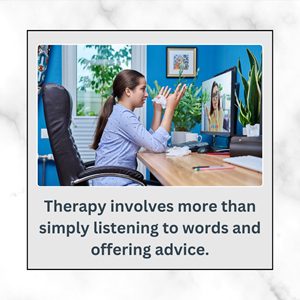 Before getting into the meat of this piece, let’s all raise our glasses to this: Once thought of as a shameful topic never discussed, mental health and therapy are shedding some of their old stigma, and becoming almost a buzz word of sorts.
Before getting into the meat of this piece, let’s all raise our glasses to this: Once thought of as a shameful topic never discussed, mental health and therapy are shedding some of their old stigma, and becoming almost a buzz word of sorts.
More and more people casually mention that they’re in therapy, and it’s encouraging to see so many folks seeking the treatment and support they need. So, cheers to that!
Now, here’s where it gets a little messy.
Where there’s the potential for a large amount of profit, entrepreneurs take notice. And as a result, some of the pillars and nuances that support the integrity of the therapeutic process and relationship crumble. While not entirely bad, some of the new digital ways of providing therapy come at a cost.
At worst, they take advantage of a highly vulnerable consumer by funneling something as delicate as mental health through the same formula used to churn out services like rideshares and food delivery.
At best, they’re no replacement for the “real thing.”
Let’s take a look.
It’s Better Help, but It’s Not the Best
They came in strong after 2020, spending millions on advertising through social media influencers, popular podcasts, and other means of spreading the word. As a company, Better Help grosses $1 billion annually.
The premise is app-based therapy. They match you with a therapist within 48 hours, and you can chat or text through your session.
A good idea in theory, especially for people who live in rural areas, there are still glaring downsides. According to this article one user recalled,
“My therapist watched TV and gave me very generic responses while I was going through the roughest phase in my life, I could see the TV in her glasses.”
and thousands of others have raised their voices about feeling similarly dismissed and let down.
And then, there’s the data scandal: Better Help allegedly shared users’ private information, and is facing a 7.8 million FTC fine as a result.
Talk is Cheap, Talk Space Isn’t
Following along the lines of Better Help, a California class action lawsuit filed against Talk Space alleges amongst other things that users were paying for services that weren’t rendered, and unwittingly signing up for a pricey monthly subscription.
Venture Capital and Psychotherapy: An Incompatible Match
Besides the two already mentioned, many VC companies see therapy as a way to make a quick buck, and are luring licensed clinicians through bait and switch practices. Things like the promise of sign-on bonuses, billing and scheduling help, and other marketing tricks.
While there’s no denying that therapy is a service, it’s extremely nuanced and involves a lot more components than, say, ridesharing, or an app that connects people with a personal trainer. Many of these companies are setting themselves up as administrative companies and therefore don’t have to adhere to the strict confidentiality guidelines that individual therapists do and are selling their customer’s data (including medical diagnoses) with companies like Google and Facebook.
 One of the most important aspects of therapy is something that is starting to disappear from our everyday life, and that’s genuine face-to-face interaction. Therapy involves more than simply listening to words and offering advice. Language may seem like the primary tool human beings use to express themselves, but there’s so much more. Expressions and body language often contradict what people are saying.
One of the most important aspects of therapy is something that is starting to disappear from our everyday life, and that’s genuine face-to-face interaction. Therapy involves more than simply listening to words and offering advice. Language may seem like the primary tool human beings use to express themselves, but there’s so much more. Expressions and body language often contradict what people are saying.
And if someone is upset, flooded with emotion, or working though something especially challenging, it’s crucial to have an expert in the room, someone there bearing witness and offering compassionate support, while also exercising critical safety precautions to keep the patient from getting too flooded.
Nothing Beats the Real Thing
In a world where things are constantly being innovated, streamlined and updated, it’s important we understand what gets lost in the process. And when the conversation is about therapy, the answer is, a lot. Find a local therapist who works for a group or individual private practice that upholds the ethical boundaries of their association.
If you’re looking for a therapist and on the fence about whether you should use an app or opt for the real thing, our vote will always be the real thing. Therapy is not something that can be rushed or delivered in its entirety neatly, quickly, and conveniently.
 It’s a commitment. A unique and powerful relationship forged between two people. There’s nothing superficial about it, and the more “real” the sessions are, the more impact can be made.
It’s a commitment. A unique and powerful relationship forged between two people. There’s nothing superficial about it, and the more “real” the sessions are, the more impact can be made.
By searching “therapist near me”, you can connect with someone local to your area. Northern California residents, we’re here for you. We offer couples counseling and individual counseling in Roseville and Fair Oaks, and are here to support you through whatever you’re going through.
Therapy in Roseville, CA, Fair Oaks, CA, or Online in California:
If you are ready to change for the better, we can help. Our therapists are ready to support you in your journey towards creating a healthy and happy lifestyle. To begin counseling in Roseville, CA area, or counseling in Fair Oaks, please follow these three simple steps:
- 1. Contact our counseling office to get more information about what therapy would be best for you and to schedule a free consultation.
- 2. Make an appointment with one of our highly trained therapists
- 3. Find support and healing in your life!
Services Offered at The Relationship Therapy Center in California:
Our Sacramento area counseling clinics located in Roseville, CA and Fair Oaks, CA are pleased to offer a variety of mental health services. Our services include but are not limited to: Couples counseling, counseling after infidelity, sex therapy, co-parent counseling, family therapy, divorce counseling, intensive couples retreats, and premarital counseling. Our individual therapy services include, anxiety treatment, therapy for children, teen therapy, depression treatment, and individual relationship counseling. We also offer online counseling to California residents. Please contact our office to learn more about the many ways we can help you and your loved ones.
